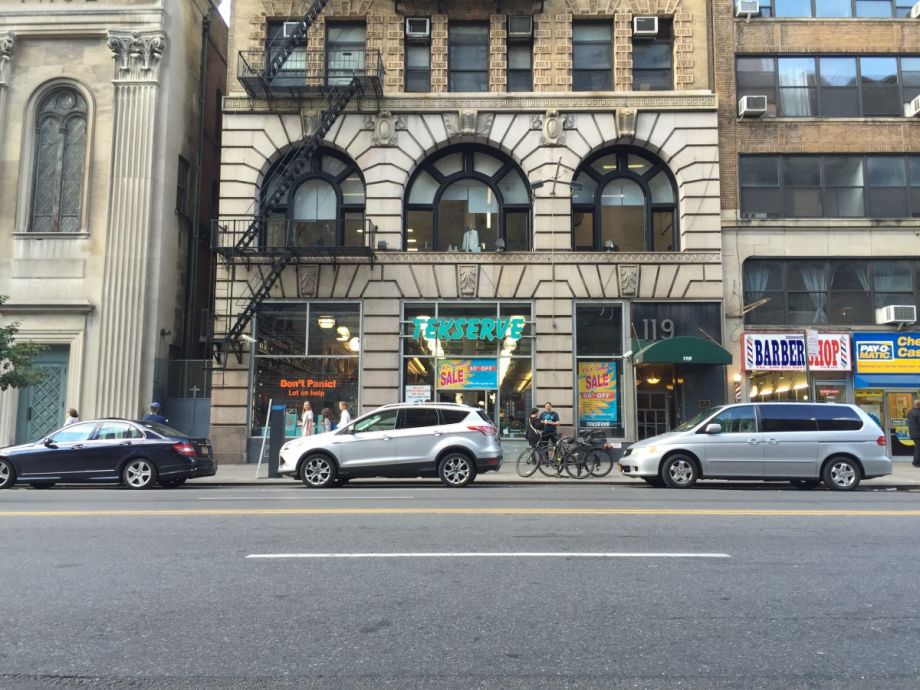Once you notice it for the first time, you can’t go back to not noticing it, and it seems to get worse every year. I’m talking about storefront vacancy in Manhattan, and across NYC.
It just doesn’t make sense. NYC sidewalks and storefronts should be prime commercial real estate, given that NYC residents — not to mention tourists — walk everywhere. Only a quarter of Manhattan households have a car, and only half of all NYC households have a car, according to the NYC Economic Development Corporation.
When freelance web developer Justin Levinson took note of Manhattan’s storefront vacancy in 2016, he did what web developers do — he mapped them.
The New York Times this year responded to the city’s alarming spike in storefront vacancy and sent a photographer and reporters around the city to document it, publishing its findings earlier this month. Some 20 percent of storefronts are vacant in New York City, up from 7 percent in 2016, the real estate brokerage firm Douglas Elliman told the New York Times.
Aptly timed, the Association for Neighborhood and Housing Development, a citywide network of nonprofit affordable housing developers and tenant organizations, also this week launched the #EndCommercialVacancy campaign to address the issue.
And now, finally, New York City Council is moving forward with a provision that may help address the spike in commercial vacancy. Sources confirmed to Crain’s New York this week that the council will finally hold a hearing on the Small Business Jobs Survival Act, sometime before the end of October.
Different versions of the Small Business Jobs Survival Act have been proposed in New York City Council since 1984, each time struck down because of lightly-examined constitutionality concerns — which some still level at the current bill. Under the current version, Crain’s reports, the bill would entitle any commercial tenant who has complied with the terms of their lease to a 10-year renewal and the right to force the negotiations into binding arbitration if the new terms are contested — perhaps because of an exorbitant rent increase.
Council Speaker Corey Johnson, whose district includes Manhattan’s West Village, Chelsea, the west side of Midtown including Times Square and the Hell’s Kitchen neighborhoods, endorsed the bill last year, Crain’s notes. NYC Mayor Bill de Blasio opposes the bill, but has not had to wield a veto, because the bill was stalled in city council by Johnson’s predecessor as council speaker, Melissa Mark-Viverito.
The Small Business Jobs Survival Act was one of several policies examined in a 2016 report on how cities are grappling with a spike in commercial rents, which Next City covered at the time. That report, from the Institute for Local Self-Reliance, cited a complex web of causes for the rise in rents, beginning with rampant real estate speculation.
“There’s a tremendous amount of footloose global capital that is looking for a place to get returns. Where a lot of that capital has landed is in urban real estate,” Stacy Mitchell, co-author of the report and co-director of the Institute, told Next City at the time. “So there’s this speculative run-up in prices that has little to do with the actual economics of a particular building.”
Mitchell also pointed out the particular nature of the kind of capital flooding urban markets — it comes with a bias against local businesses. “If you’re buying a building or renovating a building or developing a building with commercial space, if you have signed national-brand tenants, you’re going to get a better interest rate and better terms on that loan than if you’ve signed a locally owned business,” she said.
Signing a national-brand tenant can even be the difference between getting financing or not getting financing for a commercial or mixed-use development project, according to Mitchell. Local businesses that could even pay those higher rents can still get shunned by developers. “If you’re doing a development in Salt Lake City and the money is from a national source, they don’t know the King’s English Bookshop and they don’t know that’s a viable business,” she explained. “But they know who Starbucks is.”
EDITOR’S NOTE: The original version of this article incorrectly stated a position for the Association for Neighborhood and Housing Development on the Small Business Jobs Survival Act. It does not have a position on the bill. We’ve corrected the error.

Oscar is Next City's senior economic justice correspondent. He previously served as Next City’s editor from 2018-2019, and was a Next City Equitable Cities Fellow from 2015-2016. Since 2011, Oscar has covered community development finance, community banking, impact investing, economic development, housing and more for media outlets such as Shelterforce, B Magazine, Impact Alpha and Fast Company.
Follow Oscar .(JavaScript must be enabled to view this email address)
















